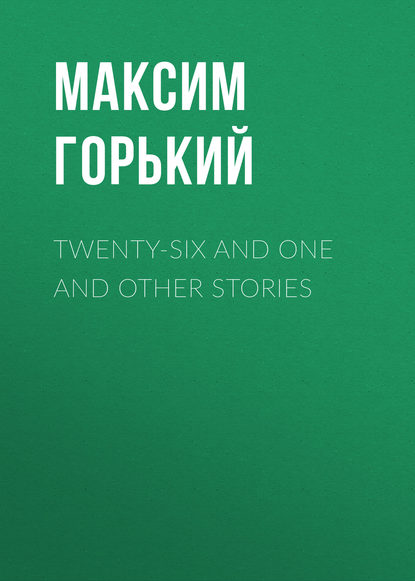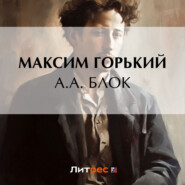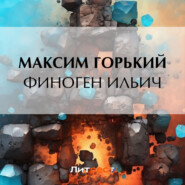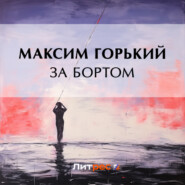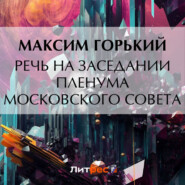По всем вопросам обращайтесь на: info@litportal.ru
(©) 2003-2025.
✖
Twenty-six and One and Other Stories
Настройки чтения
Размер шрифта
Высота строк
Поля
Tchelkache looked around him triumphantly.
"Yes, we're safe. Out! You were in luck, you worthless stick!"
Gavrilo rowed in silence; breathing heavily, he cast sidelong glances at the spot where still rose and fell the sword of fire. He could not believe that it was only, as Tchelkache said, a lantern with a reflector. The cold, blue light, cutting the darkness, awoke silver reflections upon the sea; there seemed something mysterious about it, and Gavrilo again felt his faculties benumbed with fear. The presentiment of some misfortune oppressed him a second time. He rowed like a machine, bent his shoulders as though expecting a blow to descend and felt himself void of every desire, and without soul. The emotions of that night had consumed all that was human in him.
Tchelkache was more triumphant than ever: his success was complete! His nerves, accustomed to shocks, were already calmed. His lips trembled and his eyes shone with an eager light. He felt strong and well, whistled softly, inhaled long breaths of the salt sea air, glanced about from right to left and smiled good-naturedly when his eyes fell upon Gavrilo.
A light breeze set a thousand little waves to dancing. The clouds became thinner and more transparent although still covering the sky. The wind swept lightly and freely over the entire surface of the sea, but the clouds remained motionless, and seemed to be plunged in a dull, gray reverie.
"Come, brother, wake up, it's time! Your soul seems to have been shaken out of your skin; there's nothing left but a bag of bones. My dear fellow! We have hold of the good end, eh?"
Gavrilo was glad to hear a human voice, even though it was that of
Tchelkache.
"I know it," said he, very low.
"That's right, little man! Take the tiller, I'll row; You're tired, aren't you?"
Gavrilo mechanically changed places, and when Tchelkache saw that he staggered, he pitied him more still and patted him on the shoulder,
"Don't be afraid! You've made a good thing out of it. I'll pay you well. Would you like to have twenty-five rubles, eh?"
"I – I don't need anything. All I ask is to reach land!"
Tchelkache removed his hand, spat and began to row; his long arms sent the oars far back of him.
The sea had awakened. It sported with its tiny waves, brought them forth, adorned them with a fringe of foam, tumbled them over each other and broke them into spray. The foam as it melted sighed and the air was filled with harmonious sounds and the plashing of water. The darkness seemed to be alive.
"Well! tell me." began Tchelkache. "You'll return to the village, you'll marry, you'll set to work to plough and sow, your wife'll present you with many children, you'll not have enough bread and you'll just manage to keep soul and body together all your life! So.. is it such a pleasant prospect?"
"What pleasure can there be in that?" timidly and shudderingly replied
Gavrilo. "What can one do?"
Here and there, the clouds were rent by the wind and, through the spaces, the cold sky studded with a few stars looked down. Reflected by the joyous sea, these stars leaped upon the waves, now disappearing, now shining brightly.
"More to the left!" said Tchelkache. "We shall soon be there, Yes!.. it is ended. We've done a good stroke of work. In a single night, you understand – five hundred rubles gained! Isn't that doing well, say?"
"Five hundred rubles!" repeated Gavrilo, distrustfully, but he was immediately seized with fright and quickly asked, kicking the bales at the bottom of the boat: "What are those things?"
"That's silk. A very dear thing. If it were to be sold for its real value, it would bring a thousand rubles. But I don't raise the price.. clever that, eh?"
"Is it possible?" asked Gavrilo. "If I only had as much!"
He sighed at the thought of the country, of his miserable life, his toil, his mother and all those far-distant and dear things for which he had gone away to work, and for which he had suffered so much that night. A wave of memory swept over him: he saw his village on a hill-side with the river at the bottom, hidden by birches, willows, mountain-ash and wild cherry trees. The picture breathed some life in him and gave him a little strength.
"Oh, Lord, how much good it would do!" he sighed, sadly.
"Yes! I imagine that you'd very quickly board the train and – good-evening! Oh, how the girls would love you, yonder, in the village! You could have your pick. You could have a new house built. But for a new house, there might not be enough."
"That's true. A house, no; wood is very dear with us."
"Never mind, you could have the one that you have repaired. Do you own a horse?"
"A horse? Yes, there's one, but he's very old!"
"Then a horse, a good horse! A cow.. sheep.. poultry.. eh?"
"Why do you say that? If only!.. Ah! Lord, how I might enjoy life."
"Yes, brother, life under those circumstances would not be bad.. I, too, I know a little about such things. I also have a nest belonging to me. My father was one of the richest peasants of his village."
Tchelkache rowed slowly. The boat danced upon the waves which beat against its sides; it scarcely advanced over the somber sea, now disporting itself harder than ever. The two men dreamed, rocked upon the water and gazing vaguely around them. Tchelkache had spoken to Gavrilo of his village with the purpose of quieting him and helping him to recover from his emotion. He at first spoke with a sceptical smile hidden under his moustache, but as he talked and recalled the joys of country life, in regard to which he himself had long since been disabused, and that he had forgotten until this moment, he became carried away, and instead of talking to the lad, he began unconsciously to harangue:
"The essential part of the life of a peasant, brother, is liberty. You must be your own master. You own your house: it is not worth much, but it belongs to you. You possess a piece of ground, a little corner, perhaps, but it is yours. Your chickens, eggs, apples are yours. You are a king upon the earth. Then you must be methodical.. As soon as you are up in the morning, you must go to work. In the spring it is one thing, in the summer another, in the autumn and winter still another. From wherever you may be you always return to your home. There is warmth, rest!.. You are a king, are you not?"
Tchelkache had waxed enthusiastic over this long enumeration of the privileges and rights of the peasant, forgetting only to speak of his duties.
Gavrilo looked at him with curiosity, and was also aroused to enthusiasm. He had already had time in the course of this conversation to forget with whom he was dealing; he saw before him only a peasant like himself, attached to the earth by labor, by several generations of laborers, by memories of childhood, but who had voluntarily withdrawn from it and its cares and who was now suffering the punishment of his ill-advised act.
"Yes, comrade, that's true! Oh! how true that is! See now, take your case, for instance: what are you now, without land? Ah! friend, the earth is like a mother: one doesn't forget it long."
Tchelkache came to himself. He felt within him that burning sensation that always seized upon him when his self-love as a dashing devil-may-care fellow was wounded, especially when the offender was of no account in his eyes.
"There he goes again!" he exclaimed fiercely. "You imagine, I suppose that I'm speaking seriously. I'm worth more than that, let me tell you!"
"Why, you funny fellow!" replied Gavrilo, again intimidated, "am I speaking of you? There are a great many like you! My God, how many unfortunate persons, vagabonds there are on the earth!"
"Take the oars again, dolt!" commanded Tchelkache shortly, restraining himself from pouring forth a string of fierce oaths that rose in his throat.
They again changed places. Tchelkache, while clambering over the bales to return to the helm, experienced a sharp desire to give Gavrilo a good blow that would send him overboard, and, at the same time, he could not muster strength to look him in the face.
The short conversation was ended; but now Gavrilo's silence even savored to Tchelkache of the village. He was lost in thoughts of the past and forgot to steer his boat; the waves had turned it and it was now going out to sea. They seemed to understand that this boat had no aim, and they played with it and lightly tossed it, while their blue fires flamed up under the oars. Before Tchelkache's inward vision, was rapidly unfolded a series of pictures of the past – that far distant past separated from the present by a wall of eleven years of vagrancy. He saw himself again a child, in the village, he saw his mother, red-cheeked, fat, with kind gray eyes, – his father, a giant with a tawny beard and stern countenance, – himself betrothed to Amphissa, black-eyed with a long braid down her back, plump, easy-going, gay.. And then, himself, a handsome soldier of the guard; later, his father, gray and bent by work, and his mother, wrinkled and bowed. What a merry-making there was at the village when he had returned after the expiration of his service! How proud the father was of his Gregori, the moustached, broad-shouldered soldier, the cock of the village! Memory, that scourge of the unfortunate, brings to life even the stones of the past, and, even to the poison, drunk in former days, adds drops of honey; and all this only to kill man by the consciousness of his faults, and to destroy in his soul all faith in the future by causing him to love the past too well.
Tchelkache was enveloped in a peaceful whiff of natal air that was wafting toward him the sweet words of his mother, the sage counsel of his father, the stern peasant, and many forgotten sounds and savory odors of the earth, frozen as in the springtime, or freshly ploughed, or lastly, covered with young wheat, silky, and green as an emerald.. Then he felt himself a pitiable, solitary being, gone astray, without attachments and an outcast from the life where the blood in his veins had been formed.
"Hey! Where are we going?" suddenly asked Gavrilo.
Tchelkache started and turned around with the uneasy glance of a wild beast.
"Oh! the devil! Never mind.. Row more cautiously.. We're almost there."
"Were you dreaming?" asked Gavrilo, smiling.
Tchelkache looked searchingly at him. The lad was entirely himself again; calm, gay, he even seemed complacent. He was very young, all his life was before him. That was bad! But perhaps the soil would retain him. At this thought, Tchelkache grew sad again, and growled out in reply:
"I'm tired!.. and the boat rocks!"





